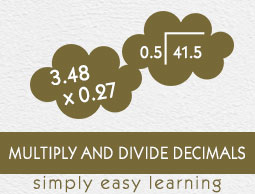
- Multiply and Divide Decimals
- Home
- Decimal Multiplication
- Multiplication of a Decimal by a Whole Number
- Decimal Multiplication: Problem Type 1
- Decimal Multiplication: Problem Type 2
- Multiplication of a Decimal by a Power of Ten
- Multiplication of a Decimal by a Power of 0.1
- Multiplication of Decimals That Have a Product Less Than 0.1
- Word Problem With Multiplication of Decimal and Whole Number
- Word Problem With Multiplication of Two Decimals
- Word Problem With Multiple Decimal Operations: Problem type 1
- Whole Number Division With Decimal Answers
- Division of a Decimal by a Whole Number
- Division of a Decimal by a 1-digit Decimal
- Division of a Decimal by a 2-digit Decimal
- Division of a Decimal by a Power of Ten
- Division of a Decimal by a Power of 0.1
- Decimal Division With Rounding
- Word Problem With Division of a Decimal and a Whole Number
- Word Problem With Division of Two Decimals
- Word Problem With Multiple Decimal Operations: Problem Type 2
- Average of Two Numbers
Squaring Decimal Bases: Products Greater Than 0.1
In numbers such as (0.29)2, the decimal 0.29 is the base and 2 is the exponent. Such numbers are repeated products of the base. Here we are considering exponential numbers where the products are greater than 0.1.
Rules for Squaring Decimal Bases
We see that squaring a decimal base is in fact same as multiplying the decimal by itself.
We treat the decimals as whole numbers by ignoring the decimal points and multiply.
After counting the total number of decimal places in these numbers, we put a decimal point after that many places from the right in the answer.
Evaluate (0.33)2
Solution
Step 1:
Consider (0.33)2. We are squaring a decimal base.
Step 2:
We treat the decimals as whole numbers by ignoring the decimal points and multiply.
33 × 33 = 1089
Step 3:
After counting the total number of decimal places which is four in these numbers, we put a decimal point after four places from the right in the answer.
So, 0.33 × 0.33 = 0.1089
We see that that the product is greater than 0.1
Evaluate (1.01)2
Solution
Step 1:
Consider (1.01)2; here, we are squaring a decimal base.
Step 2:
We treat the decimals as whole numbers by ignoring the decimal points and multiply.
101 × 101 = 10201
Step 3:
After counting the total number of decimal places which is four in these numbers, we put a decimal point after four places from the right in the answer.
So, 1.01 × 1.01 = 1.0201
We see that that the product is greater than 0.1